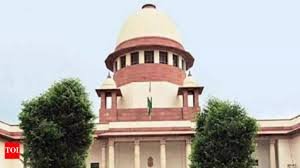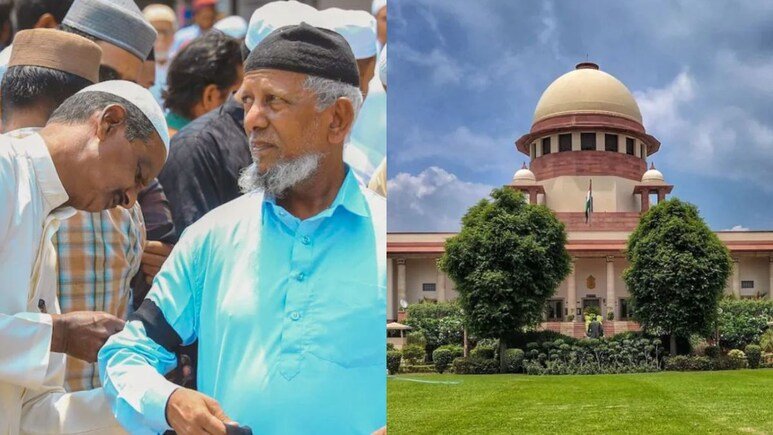
In a crucial legal development, the Supreme Court of India has reserved its verdict in a case challenging the validity of the Waqf Act. This case has drawn national attention as it raises serious questions about religious land ownership, the role of Waqf Boards, and whether secular laws should manage religious properties. During the hearings, the court also made a notable reference to Hinduism, sparking interest across both legal and religious communities.
The case revolves around the powers and authority granted to Waqf Boards under the Waqf Act, 1995. Petitioners have questioned the constitutional validity of the law, saying it grants special rights to Muslim religious bodies that are not equally extended to other religious communities like Hindus, Sikhs, Christians, or Buddhists.
The Waqf Act, 1995, is a law enacted by the Indian Parliament that governs Waqf properties. In Islamic tradition, Waqf refers to a permanent dedication of property—usually for religious, educational, or charitable purposes. Once a property is declared as Waqf, it becomes inalienable and cannot be sold or transferred.
There are Waqf Boards established at the state and national levels. These boards manage and oversee thousands of Waqf properties across India. These include mosques, graveyards, schools, hospitals, and other institutions.
Petitioners have raised concerns that the Act discriminates against non-Muslims by not offering similar frameworks for other religious groups.
What is the Issue?
The main argument in court is whether a secular government can have different laws for managing religious properties based on faith. According to the petitioners, the Waqf Act violates Article 14 of the Indian Constitution, which guarantees equality before the law. They claim that by creating a separate law for Muslim properties, the state is favoring one religion.
On the other hand, the Waqf Board and its supporters argue that the law is not discriminatory but rather protective of community-held religious property. They say that the Hindu Endowments Acts and Church Acts in different states serve a similar purpose for other communities.
Supreme Court’s Observations
During the final day of hearings, the Supreme Court bench, led by Chief Justice D.Y. Chandrachud, made a significant observation. While discussing how religious donations and land grants are viewed in various faiths, the Chief Justice said, “In Hinduism, too, people donate land to temples or for community purposes with the belief that it’s an act of merit.”
This statement shows that the concept of religious donation is not limited to any one religion. The court seemed to acknowledge that managing religious properties is a complex issue, and it exists across different communities in India.
This reference to Hinduism was intended to broaden the perspective and not limit the discussion to Islamic law alone. The court emphasized that cultural and religious practices involving land and property are an age-old tradition in Indian society.
Political and Social Reactions
The case has political implications as well. Some political leaders and social activists have supported the petitioners, claiming the Waqf Act gives unfair advantages to one religious community. They have demanded a uniform legal framework to manage religious properties across all communities.
Others have called for reforms rather than cancellation. They believe Waqf properties are often mismanaged, and reforms in governance, transparency, and accountability are necessary.
Muslim organizations, meanwhile, have urged the court to protect the Waqf system, saying that it is deeply rooted in community welfare and provides important charitable services like free education and healthcare to the poor.
Land and Property Concerns
The Waqf Board currently claims ownership over more than 6 lakh properties across India. This includes urban and rural lands, some of which are in prime commercial locations. Critics argue that the ambiguity in property documentation and lack of government scrutiny have led to illegal occupation, corruption, and even land-grabbing.
In states like Maharashtra, Uttar Pradesh, and Karnataka, there have been several legal disputes over whether land belongs to private owners or was wrongfully classified as Waqf property.
Petitioners told the court that this has created a parallel land law system, where ordinary citizens are forced into long legal battles over land rights.
Why This Case Matters
The verdict in this case will have long-term effects on how religious properties are managed in India. If the court strikes down parts of the Waqf Act, it could open the door to similar challenges against other religious property laws. On the other hand, if the Act is upheld, it may reaffirm the state’s role in managing religious property under separate laws.
This case also raises questions about India’s secular identity. Should a secular state have different laws for different faiths? Or should it move toward a uniform system for all religious institutions?
It also puts a spotlight on the need for transparent management of religious assets. Whether it’s a mosque, temple, or church, public accountability and proper legal documentation are important to prevent misuse of property.
The Supreme Court has reserved its verdict, meaning the judges have completed hearings and will now take time to write a detailed judgment. The verdict could take weeks or even months depending on the complexity of the case.
Until then, both supporters and critics of the Waqf Act are closely watching the developments. Whatever the outcome, this case will likely set a major precedent in Indian legal history.
The Waqf Act case is not just about one law—it is about how religion, law, and state interact in modern India. As the Supreme Court prepares its verdict, the nation waits to see how it will balance the principles of equality, secularism, and religious freedom.
The court’s mention of Hindu practices during the hearings shows an effort to take a holistic view of religious traditions in India. The final verdict could reshape how we manage religious lands and how we interpret secular governance in the context of a multi-faith democracy.































